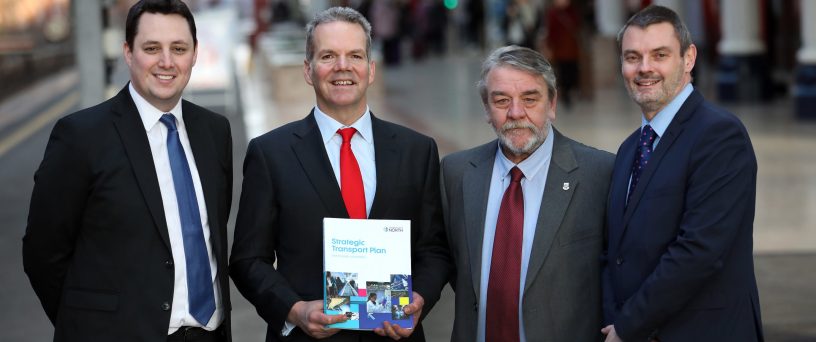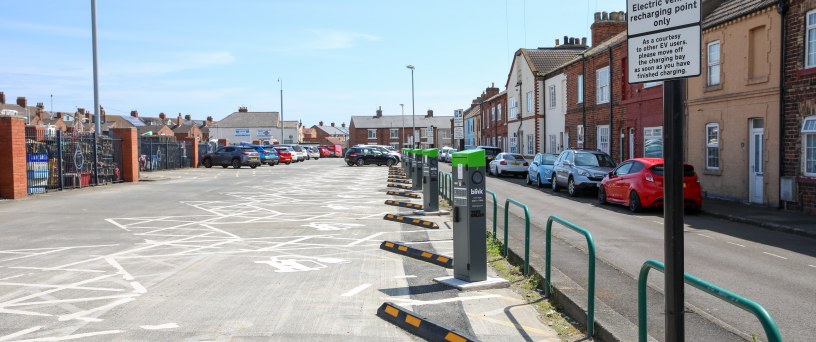
Explore topics
Home » News » Tees Valley Leaders Launch Plan To Transform The Region
Tees Valley Leaders Launch Plan To Transform The Region
Tees Valley Combined Authority | Published on: 17th January 2018
Plans for future transport investment in Tees Valley and the wider North of England have been outlined today at an event marking the publication of a thirty year plan to drive economic growth.
Ben Houchen, Tees Valley Mayor and Paul Booth, Chair of Tees Valley Local Enterprise Partnership launched the plan at Business Central in Darlington. The Mayor and LEP Chair who represent Tees Valley on Transport for the North’s Partnership Board, accompanied its new Chief Executive Barry White to Darlington Station. The station is at the hub of the Darlington 2025 Vision to redevelop the station and its surrounding area to create a modern rail hub for a modern economy by 2025.
Transport for the North’s Strategic Transport Plan is the first of its kind and outlines how connections across the North of England need to be improved to drive growth and close the economic gap between the North and the rest of England. The public are now being asked to share their thoughts on the proposals through a thirteen-week consultation.
Aimed at rebalancing the UK’s economy through a sustained 30-year programme of transport infrastructure investment, the plan could deliver a £100 billion boost to the economy and 850,000 additional jobs by 2050.
Ben Houchen, Tees Valley Mayor said, “I am pleased that my transport priorities have been singled out in Transport for the North’s plan.
“Redeveloping Darlington station and improving the A19 and A66 are absolutely critical if we are to build Tees Valley that works for everyone. Over the coming months, I’ll be pushing to ensure this vision is backed up by proper financial commitments from government.”
Transport for the North is working to make it easier for people and goods to travel across the region, increasing access to jobs, supporting businesses and improving the movement of freight and goods across the North and to its ports and airports. Seven ‘corridors’ of opportunity are identified in the plan that are key to achieving these aims.
The ‘Connecting the Energy Coasts’ corridor will improve connectivity between some of the UK’s important non-carbon energy and research assets in Cumbria, Lancashire, North Yorkshire, the North East and Tees Valley whilst the ‘East Coast to Scotland’ will improve corridor speed and reach along the East Coast Main Line and other key lines to provide enhanced connectivity in the North East, Tees Valley and North Yorkshire as well as onward connections into Scotland.
Whilst a full list of the improvements which will be needed has not yet been published, emerging priorities for the Tees Valley area include major improvements to the A66 route, ensuring that Darlington and other East Coast Main Line stations are ready for the arrival of HS2 and Northern Powerhouse Rail and providing a new River Tees road crossing. These are in addition to the baseline investment assumptions set out within the plan.
John Cridland, Transport for the North Chairman, said, “The North is a rich, diverse region and home to around 16 million people. We have vibrant communities, buzzing cities, five stunning national parks, an abundance of talent and a wealth of high-performing businesses. Transport for the North’s vision is of a thriving North of England, where modern transport connections drive economic growth and support an excellent quality of life.
“For the first time, civic and business leaders and transport operators are speaking with one voice on transport to make sure the North fulfils its potential. Our plan proposes a revolutionary investment programme that will make it possible to travel to high quality jobs. This is an ambitious programme that will improve our roads and railways, and will also drive a sea change in skills development in the North and ensuring we meet that historic gap in investment.”
Councillor Bill Dixon, Leader of Darlington Council and Tees Valley Cabinet Member for Transport, said: “Tees Valley has worked hard to ensure our own transport priorities are reflected in TfN’s plans, and that the Tees Valley plays its role in supporting connectivity across the North. Stockton and Darlington delivered the world’s first passenger railway, and 200 years later we remain at the forefront of developments in the transport industry”.
Alongside the corridors, Transport for the North has for the first time outlined its emerging vision for Northern Powerhouse Rail, a rapid, reliable and resilient rail network between the North’s six biggest cities and other significant economic centres, including Darlington. This is accompanied by an updated Rail Strategy for investment in the North’s existing lines, stations, services and franchise operations, reflecting the planned integration of Rail North into Transport for the North in April this year.
In the short-term, Transport for the North has commenced a rolling programme from now until 2021 to introduce integrated and smart ticketing across the North of England. This will make paying for and planning travel much easier, starting in major cities and across the busiest routes.
The investment priorities are backed up by research that links the North’s prime capabilities in advanced manufacturing, digital, energy and health innovation. The cost of the 30-year plan is estimated to equate to less than £150 per northern citizen per year, or £2-2.3 billion per year.
This figure also includes spending which would already be expected as part of ongoing strategic transport investment in the North, with only £50 per person per year (£700-900 million per year) additional spending. Regional spend figures issued by the Infrastructure and Projects Authority for the four years from 2017 calculated that projected Government spend on strategic transport will be £1,039 per head for the three Northern regions (North West, North East, Yorkshire and Humber).
Tees Valley LEP Chair Paul Booth said: “In the modern business environment connectivity is key. Poor connectivity across the North and a historic lack of investment is holding back the economic potential of the North of England. This new strategic plan brings together a credible programme of investment to transform the future of the North, and I urge business leaders to get behind this programme and push for its successful delivery”.
The public consultation on the Strategic Transport Plan will run until 17 April 2018 with engagement events taking place across the North, including in Stockton-on-Tees on 4th March. A final version of the plan will be published later in the year and submitted to the Government for ministerial consideration.
Find out more by visiting www.transportforthenorth.com.
Share this post

